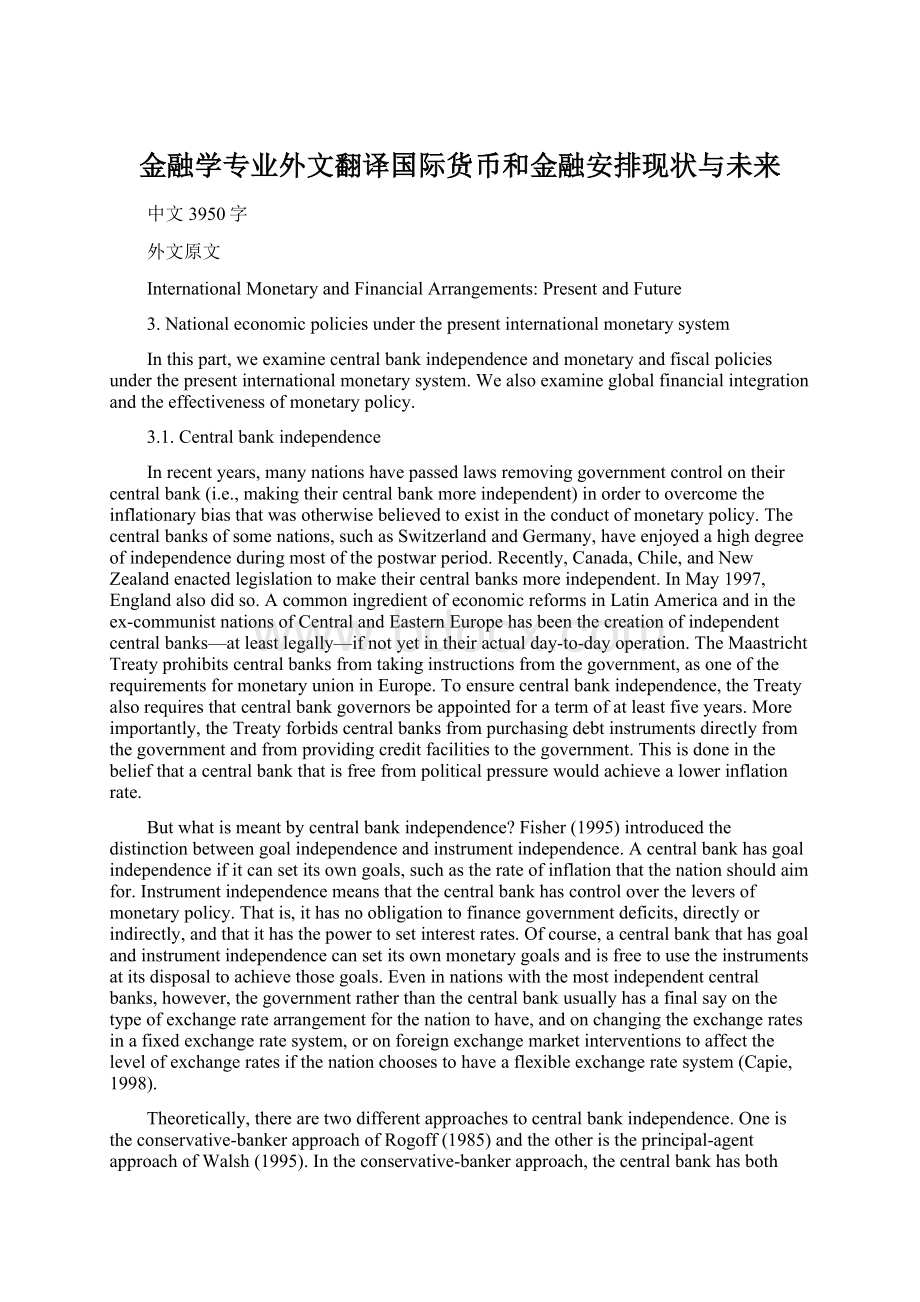金融学专业外文翻译国际货币和金融安排现状与未来.docx
《金融学专业外文翻译国际货币和金融安排现状与未来.docx》由会员分享,可在线阅读,更多相关《金融学专业外文翻译国际货币和金融安排现状与未来.docx(7页珍藏版)》请在冰豆网上搜索。

金融学专业外文翻译国际货币和金融安排现状与未来
中文3950字
外文原文
InternationalMonetaryandFinancialArrangements:
PresentandFuture
3.Nationaleconomicpoliciesunderthepresentinternationalmonetarysystem
Inthispart,weexaminecentralbankindependenceandmonetaryandfiscalpoliciesunderthepresentinternationalmonetarysystem.Wealsoexamineglobalfinancialintegrationandtheeffectivenessofmonetarypolicy.
3.1.Centralbankindependence
Inrecentyears,manynationshavepassedlawsremovinggovernmentcontrolontheircentralbank(i.e.,makingtheircentralbankmoreindependent)inordertoovercometheinflationarybiasthatwasotherwisebelievedtoexistintheconductofmonetarypolicy.Thecentralbanksofsomenations,suchasSwitzerlandandGermany,haveenjoyedahighdegreeofindependenceduringmostofthepostwarperiod.Recently,Canada,Chile,andNewZealandenactedlegislationtomaketheircentralbanksmoreindependent.InMay1997,Englandalsodidso.AcommoningredientofeconomicreformsinLatinAmericaandintheex-communistnationsofCentralandEasternEuropehasbeenthecreationofindependentcentralbanks—atleastlegally—ifnotyetintheiractualday-to-dayoperation.TheMaastrichtTreatyprohibitscentralbanksfromtakinginstructionsfromthegovernment,asoneoftherequirementsformonetaryunioninEurope.Toensurecentralbankindependence,theTreatyalsorequiresthatcentralbankgovernorsbeappointedforatermofatleastfiveyears.Moreimportantly,theTreatyforbidscentralbanksfrompurchasingdebtinstrumentsdirectlyfromthegovernmentandfromprovidingcreditfacilitiestothegovernment.Thisisdoneinthebeliefthatacentralbankthatisfreefrompoliticalpressurewouldachievealowerinflationrate.
Butwhatismeantbycentralbankindependence?
Fisher(1995)introducedthedistinctionbetweengoalindependenceandinstrumentindependence.Acentralbankhasgoalindependenceifitcansetitsowngoals,suchastherateofinflationthatthenationshouldaimfor.Instrumentindependencemeansthatthecentralbankhascontrolovertheleversofmonetarypolicy.Thatis,ithasnoobligationtofinancegovernmentdeficits,directlyorindirectly,andthatithasthepowertosetinterestrates.Ofcourse,acentralbankthathasgoalandinstrumentindependencecansetitsownmonetarygoalsandisfreetousetheinstrumentsatitsdisposaltoachievethosegoals.Eveninnationswiththemostindependentcentralbanks,however,thegovernmentratherthanthecentralbankusuallyhasafinalsayonthetypeofexchangeratearrangementforthenationtohave,andonchangingtheexchangeratesinafixedexchangeratesystem,oronforeignexchangemarketinterventionstoaffectthelevelofexchangeratesifthenationchoosestohaveaflexibleexchangeratesystem(Capie,1998).
Theoretically,therearetwodifferentapproachestocentralbankindependence.Oneistheconservative-bankerapproachofRogoff(1985)andtheotheristheprincipal-agentapproachofWalsh(1995).Intheconservative-bankerapproach,thecentralbankhasbothgoalandinstrumentindependence.Presumably,theconservativebankerwillweighdeviationsofbothinflationandoutputfromtargetlevelsinsettingmonetarypolicy,butwithabiasinfavoroflowerinflation,evenifthiscomesattheexpenseoflowergrowth.Intheprincipal-agentapproach,ontheotherhand,thecentralbankerhasinstrumentindependence,butnotgoalindependence.Thatis,thegovernmentsetsthemonetarygoal,suchastherateofinflationforthenation,andthenthecentralbankisfreetoemploywhatevermonetaryinstrumentsithasatitsdisposalintryingtomeetthemonetarygoal.Theprincipal-agentgoalismostexplicitinthecaseofNewZealand,wherethegovernorofthecentralbankformallyagreestomeettheinflationtargetsetbythegovernment,withhisjobonthelineifhefailstomeetthetarget.InCanadaandEngland,itisthereputationofthecentralbankthatisonthelineiftheinflationtargetisexceeded.
Today,thereisgeneralagreementthatacentralbankshouldhaveinstrument,butnotgoalindependence.Therearetworeasonsforthis.Thefirstisthatthemonetarygoalofthenationshouldreflectthesocialwelfarefunctionofthenationandnotjustthepreferencesofthecentralbankgovernor.Thesecondisthatthereistheneedtocoordinatemonetaryandfiscalpoliciestoavoidtheiroperatingatcrosspurposesofeachother.Centralbankaccountability,however,isneededtoensurethatthemonetarygoalsofthenationare,infact,pursuedbythenation’scentralbank.InthecaseofNewZealandthegovernorofthecentralbankisaccountabletothefinanceminister.IntheUnitedStates,theFederalReserveBankortheFed(theUScentralbank)isgenerallyaccountabletoCongress,whichmustratifythechoiceofthechairmanoftheFedandcansummonhimtoexplainhispolicies.InGermany,theBundesbankisaccountabletothepublicatlargeforitspoliciesindefenseofthecurrency.Inrecentyears,agrowingnumberofcountriesarefollowingtheleadofNewZealandinsettingexplicitinflationtargetsforthecentralbank.Thisprovidestransparencyandaccountability,whichareveryimportantinestablishingcredibilityforthegovernment’smonetarypolicy.Themorecredibleacentralbankis,themoreitwillbeabletocutinterestratesinaslowdownwithouttriggeringhigherinflationaryexpectationsandhencehigherlong-terminterestrates,orraisinginterestratestocurbemerginginflationarypressureswithoutthefearoftriggeringarecession.Itistoincreasetransparencyandaccountability,andhenceitscredibilityandeffectiveness,thatthecentralbankofseveralcountries,includingtheUnitedStates,haverecentlystartedtoexplaintheirdecision-makingprocess(includingthelaggedpublicationoftheminutesoftheirmeetingsbytheUSFed)andoperatingprocedureintheirconductofmonetarypolicy.Thefact,however,thattheUSFed,asopposedtomostothercentralbanks,isconstitutionallyrequiredtopursuebothpricestabilityandfullemployment,reducesitseffectivenessasaninflationfighterwhenaconflictarisesbetweenitstwogoals(Salvatore,1998d).
3.2.Centralbankindependenceandinflation
Asexpected,anumberofempiricalstudieshaveshownaninverserelationshipbetweencentralbankindependenceandtherateofinflationinindustrialcountries.Thatis,themoreindependentthecentralbankofanindustrialcountryis,thelowertherateofinflationinthenation.OneofthemostcomprehensiveofthesestudiesistheonebyAlesinaandSummers(1993).Theauthorsincludedthefollowing16industrialcountriesinthestudy:
Australia,Belgium,Canada,Denmark,France,Germany,Italy,Japan,theNetherlands,NewZealand,Norway,Spain,Sweden,Switzerland,theUnitedKingdom,andtheUnitedStates.
Thesampleperiodwasfrom1955to1988.Asinpreviousstudies,theauthorsfoundanegativecorrelationbetweenthelevelofcentralbankindependenceandtherateofinflation.Theyalsofoundthatthemoreindependentacentralbankwas,thesmallerwasthevariabilityoftheinflationrate(becauseofthepositivecorrelationbetweenthelevelandvariabilityofinflation).
Asitiswellknown,however,correlationdoesnotestablishcausality.Thatis,thenegativecorrelationbetweencentralbankindependenceandinflationfoundinempiricalstudiesdoesnotimplythattheformercausesthelatter.Itmayverywellbethatcountrieswithastrongeraversiontoinflationaremorelikelytogivemoreindependencetotheircentralbanks.Thus,itistheinflationaversioninthenationthatgivesrisebothtolowerinflationandtoamoreindependentcentralbankinthenation,ratherthanamoreindependentcentralbankbeingresponsible(i.e.,causing)lowerinflation.Unless,however,webelievethatlawsandinstitutionsareentirelyirrelevantandhavenoeffectwhatsoeveroneconomicperformance(heretherateofinflation)wemustconcludethatamoreindependentcentralbankismorelikely,otherthingsequal,toleadtolowerinflationthanalessindependentcentralbank.
Assupportforcentralbankindependencehasincreasedaroundtheworld,sohasthetendencytoentrusttocentralbanksthesolefunctionofachievingagiveninflationtargetorrange.This,however,raisesthequestionofwhetheritwouldbemoreappropriatetoentrustthecentralbankwithatargetthatismoredirectlycontrollablebythecentralbank,suchasthegrowthofanarrowmoneyaggregate,ratherthanaspecificinflationtarget.Settinganinflationtarget,however,seemsmoreappropriatetodayinviewofthecollapseoftherelationshipbetweenmoneygrowthandinflationinonecountryafteranother.
Asaresult,itisbettertoassignanexplicitinflationtargettothecentralbankandprovideitwithinstrumentindependencetopursuetheinflationtarget.Astowhythecentralbankshouldbegivenaspecificinflationtargetratherthanagrowth-of-real-GDPorrate-of-unemploymenttarget,theansweristhatinflationisamonetaryphenomenonwhiletherateofgrowthofrealGDPandtherateofunemploymentarerealphenomena.Realphenomenaare,ofcourse,affectedbymonetaryphenomena,butherethechainofcausalitydependsonpoliciesandinstitutionsthatarenotunderthedirectcontrolofthecentralbank.Ingivingaspecificinflationtargettothecentralbank,itisimportanttopointoutthatfixedexchangeratesarelessinflationarythanflexibleexchangerates.
Thus,acountrythatistryingtomovefromahightoalowinflationenvironmentwoulddowelltoadoptafixedratherthanavariableexchangeratesystemasameansofanchoringmonetaryp